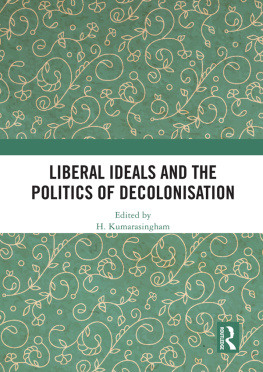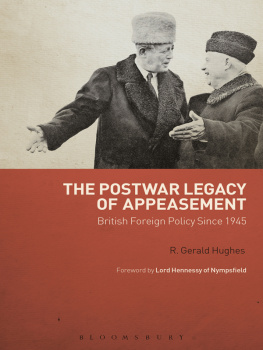BRITISH GOVERNMENT POLICY AND DECOLONISATION 19451963
ROUTLEDGE SERIES: BRITISH FOREIGN AND COLONIAL POLICY ISSN: 14675013
Series Editor: Peter Catterall
This series provides insights into both the background influences on and the course of policymaking towards Britains extensive overseas interests during the past 200 years.
Whitehall and the Suez Crisis, Saul Kelly and Anthony Gorst (eds)
Liberals, International Relations and Appeasement: The Liberal Party, 19191939, Richard S. Grayson
British Government Policy and Decolonisation, 19451963: Scrutinising the Official Mind, Frank Heinlein
BRITISH GOVERNMENT POLICY AND DECOLONISATION 19451963
Scrutinising the Official Mind
Frank Heinlein
European University Institute, Florence
With a Foreword by
ROBERT HOLLAND
First published in 2002 in Great Britain by
Routledge
2 Park Square, Milton Park, Abingdon, Oxon, OX14 4RN
270 Madison Ave, New York NY 10016
Transferred to Digital Printing 2007
Copyright 2002 F. Heinlein
British Library Cataloguing in Publication Data
Heinlein, Frank
British government policy and decolonisation, 194563: Scrutinising the Official Mind. (Cass series. British foreign and colonial policy)
1. Decolonization 2. Great Britain Colonies Administration 3. Great Britain Foreign relations 1945 4. Great Britain Politics and government 1945
1. Title
325.34109045
ISBN 0714652202 (cloth)
ISSN 14675013
Library of Congress Cataloging-in-Publication Data
Heinlein, Frank, 1969
British government policy and decolonisation, 19451963: Scrutinising the Official mind/Frank Heinlein.
p. cm. (Cass series-British foreign and colonial policy series, ISSN 14675013) Revised version of authors PhD thesis at the European University Institute in Florence, 1999.
Includes bibliographical references and index.
ISBN 0714652202
1. DecolonizationGreat BritainColoniesHistory20th century. 2. ImperialismGovernment policyGreat BritainHistory20th century 3. Great BritainColoniesHistory20th century. 4. Commonwealth countriesHistory20th century. I Title. II. Series.
DA16 .H45 2002 | 325.341009045-dc21 | 2001053932 |
All rights reserved. No part of this publication may be reproduced, stored in or introduced into a retrieval system or transmitted in any form or by any means, electronic, mechanical, photocopying, recording or otherwise, without the prior written permission of the publisher of this book.
Cover illustration: British troops raising the flag during the Suez conflict.
Source: photograph reproduced courtesy of Ullstein Bild.
Publishers Note
The publisher has gone to great lengths to ensure the quality of this reprint but points out that some imperfections in the original may be apparent
D URING THE past 20 years, the end of the British empire after the Second World War has been the subject of a growing and lively literature. First, there were a number of broad synopses; to these were gradually added monographs concerned with events in particular territories and regions; and, during the 1990s, the British Documents on the End of Empire series, courtesy of The Stationery Office, published impressive and bulky volumes of official documentation concerning both individual colonies and the colonial and Commonwealth policies of successive British Governments.
As any fresh historiography unfolds, however, there is a critical need for historians to take stock of the sheer accumulation of knowledge, to check the consistency and persuasiveness of arguments put forward, and to summarise the balance of collective analysis. In the present state of the study of British policy-making in the era of decolonisation, this needs to be done, not by the recitation of already familiar narratives, but by engaging with our increasing awareness of the diversity and changing shape of motivations and methods involved in transfers of power from 1945 through to the 1960s. Frank Heinleins book is important because it provides just such a comprehensive stock-taking of a complicated and evolving subject.
The achievements of this volume are considerable. Let me identify just a few of them. There are a number of what purport to be broad analyses of decolonisation that on examination are really about a particular region or aspect. In framing his own approach, Heinlein seems equally grounded in East and West Africa, south-east Asia and the Middle East. While some works are based overwhelmingly on secondary reading, and others on some dense patch of archival material, here the secondary and primary sources are blended appropriately together. Often, histories of decolonisation appear, other than by a glancing reference to the Suez episode, or the Cold War, to treat colonial policy (or, come to that, colonial nationalism), as if it had existed in a vacuum. By contrast, Heinlein integrates such themes as sterling crises, pressures emerging from a unifying Europe and superpower rivalries into his account in a serious and sustained way. The Commonwealth association is something of a missing ghost in the literature of decolonisation, often ignored, or made the subject of some modest aside. Here, it is grafted on to the story, and given the importance that it undoubtedly had for contemporary policy-makers.
Heinlein is surely right to argue that there cannot be a single compelling theory as to why the British empire ended, because the factors and forces which operated in the various compartments of imperial and colonial policy India, the formal colonial empire, the informal empire of the Middle East were not the same. There was never one indivisible British empire, but many empires within the Empire, and each of them had its own networks, and characteristic techniques of management. On the whole, however, the arguments put forward in these pages are not those of an economic determinist. Heinleins emphasis is rather on the degree to which Britain clung to its imperial role so long, not because it was materially profitable, but because it was the role which most suited the self-imagery of its leading political class; and the empire was not dismantled when it ceased to be congruent with commercial interest, but when metropolitan self-imagery gradually flaked apart. Prestige and power, not money, lies at the root of the process. This is surely broadly true, and one is left with a feeling that what we need now is not more accounts of decolonisation in its political guise, but an exploration of the meanings of prestige or what Lord Palmerston called moral power in the general context of modern British history, including the ending of empire.
In his conclusions on the future agenda of historiography in this area, Heinlein makes one suggestion which seems particularly apposite. To put decolonisation in its most sophisticated perspective, we now need to engage historically with post-independence aftermaths. For example, as yet, we do not have a convincing treatment of the great variety of post-colonial relationships between ex-rulers and ex-ruled. Decolonisation is consequently written about as if the great destination the culmination of all things had been independence. Yet it was with what was to come after that everybody policy-makers in imperial capitals, anti-colonial nationalists, minority groups within plural territories, peasant masses with a still dawning political consciousness was really thinking about during transfers of power. This great cusp running through the climaxes of decolonisation, and onwards into a world of new states riven with old conflicts, will hopefully be the cutting edge of much new writing during the next few years.








